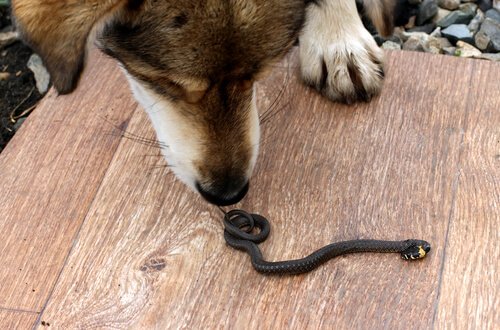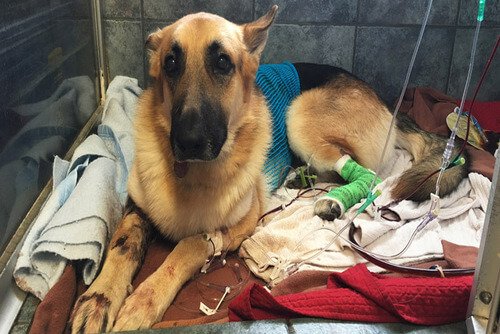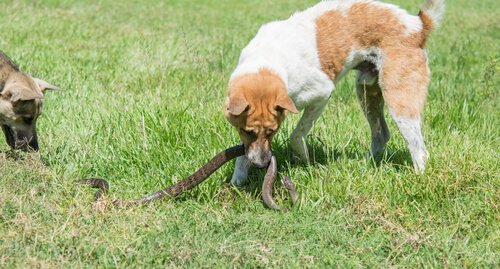What To Do If Your Dog Is Bitten By A Snake

Although you may think it will never happen to your dog, snake bites are more likely to happen if you live in the country or you like going on hikes in the mountains with your dog. 15,000 are victims of snake bites every year. If your dog is bitten, you should pay attention to the symptoms and follow these steps below.
If you live in a rural area or like to exercise with your dog in the mountains, it’s possible that you could find yourself in a situation as the one mentioned above. Although it may not be very common, it’s certainly something that can happen. Continue reading to learn what to do if your dog gets bitten by a snake.
Although it may seem unusual, there are statistics showing that every year around 15,000 pets are bitten by a snake. This happens because these animals chase after anything that moves out of pure instinct. You already know that snakes have little patience …
Snake bite symptoms in dogs
Sometimes, people may notice that their dog was bitten and on other occasions they may not notice it all. Therefore, it’s important to learn how to identify what the symptoms are:
- Lethargy and disorientation
- Tachycardia
- Bite marks
- Inflammation
- Excessive salivation
- Spasms

These symptoms usually appear a few seconds after the bite, so you must act fast. What should you do if a snake bites your dog?
When a snake bites your dog
Follow these tips:
- Keep calm. Your animal will feel anxious if he sees you acting anxious, and that will not help either of you. If you are anxious, you will have a hard time taking charge of the situation and your pet won’t let you touch him.
- Find the bite. The inflammation will make it easy for you to find location of the bite.
- Soap and water. Do not apply alcohol or anything that could irritate the animal. Using soap and water to clean the wound will be more than enough in this case. Don’t t rub it on or try to clean inside the wound. Only use it to clean the surface.
- Don’t let the animal move around. Because most snake bites cause an accelerated heart rate and breathing, it is important to prevent your pet from doing any exercise, and if possible, stop him from moving around. This way, the venom won’t move to other parts of the body.
- Remove his collar. If the bite was on or near your animal’s neck, the swelling could cause the collar to tighten around his neck to such an extent that it can choke him. Remove the collar as soon as possible, even before washing the wound.
- Take a picture of the attacker. If you can, very carefully take a snapshot of the snake that has bitten your pet. This could greatly help the veterinarian determine the treatment he needs to give your animal.
- Go to the vet. You cannot do anything more for your dog at this point. Take him immediately to the vet, and let the vet take care of the situation. Vets are used to dealing with these types of situations, and they know how to stop the venom so your animal will recover quickly.

What not to do
Don’t do anything else other than the steps in this article. There are things you should not do, no matter how often you have seen them in the movies or what other poeple have told you. Here are some things you should not do:
- Make a tourniquet. Don’t do this because you could harm the animal. Only veterinarians and specialists are trained to perform this maneuver on animals.
- Don’t suck the wound. This will not help your animal at all, and you could even put yourself in danger.
Depending on the country you live in, there will be different types of snakes, some of which are not poisonous. If the bite is from a nonvenomous snake, your dog will only feel pain.
In this case, the precautions are minor, but a visit to the veterinarian will never be a bad idea. So, it’s best to be prepared, and know how to act quickly to save your pet’s life.